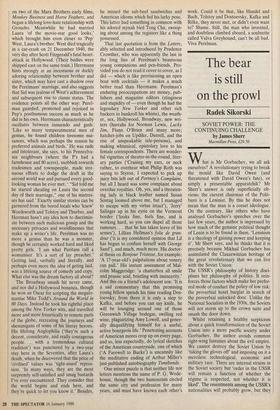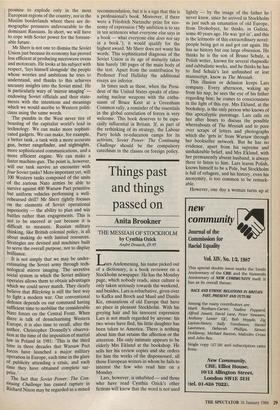The bear is still on the prowl
Radek Sikorski
SOVIET POWER: THE CONTINUING CHALLENGE by James Sherr
Macmillan Press, £29.50
What is Mr Gorbachev, we all ask ourselves? A revolutionary trying to break the mould like David Owen (and threatened with David Owen's fate), or simply a presentable apparatchik? Mr Sherr's answer is only superficially ob- vious: the current chairman of the Polit- buro is a Leninist. By this he does not mean that the man is a corset ideologue. On the contrary, like others who have analysed Gorbachev's speeches over the last few years, the author is impressed by how much of the genuine political thought of Lenin is to be found in them. 'Leninism is a theology of gaining power and keeping it', Mr Sherr says, and he thinks that it is precisely because Mikhail Gorbachev has _ assimilated the Clauzewitzian heritage of the great revolutionary that we can live with the Soviet Union: The USSR's philosophy of history disci- plines her philosophy of politics. It rein- forces those factors which make her prefer- red mode of conduct the policy of low risk: the proverbial hotel burglar in search of the proverbial unlocked door. Unlike the National Socialists in the 1930s, the Soviets will not storm up to the crown suite and smash the door down.
Whilst retaining a healthy scepticism about a quick transformation of the Soviet Union into a more pacific society under Gorbachev, the author avoids common right-wing fantasies about the evil empire. We cannot destroy the Soviet Union by 'taking the gloves off' and imposing on it a merciless technological, economic and military race. There are internal strains in the Soviet society but 'order in the USSR will remain a function of whether the regime is respected, not whether it is liked'. The resentments among the USSR's nationalities will probably grow, but they promise to explode only in the most European regions of the country, not in the Muslim borderlands where there are de- mographic pressures unfavourable to the dominant Russians. In short, we will have to cope with Soviet power for the foresee- able future.
Mr Sherr is not one to dismiss the Soviet Union just because its economy has proved less efficient at producing microwave ovens and motorcars. He looks at his subject with respect, 'lays himself alongside' the people whose worries and ambitions he tries to understand, and thanks to this achieves uncanny insights into the Soviet mind. He is particularly wary of 'mirror imaging' — endowing Soviet officials and their state- ments with the intentions and meanings which we would ascribe to Western politi- cians using the same words.
The pundits in the West never tire of boasting of the capitalist world's lead in technology. We can make more sophisti- cated gadgets. We can make, for example, a better tank, a tank with a more accurate gun, better rangefinder, and nightsights, more sophisticated communications, and a more efficient engine. We can make a faster machine-gun. The point is, however, will our tank survive an encounter with four Soviet tanks? More important yet, will 100 Western tanks composed of the units of the various Nato armies be able to survive against 400 Warsaw Pact primitive but uniform vehicles performing a well- rehearsed drill? Mr Sherr rightly focuses on the elements of Soviet operational superiority — the ability to plan and win battles rather than engagements. This is not to be sneered at just because it is difficult to measure. Russian military thinking, like British colonial policy, is all about making do with limited resources. Strategies are devised and machines built to serve the overall purpose, not to display brilliance.
It is not simply that we may be under- estimating the Soviet army through tech- nological mirror imaging. The secretive social system in which the Soviet military operates allows them to obtain advantages which we could never match. They clearly believe that Blitzkrieg is still the best way to fight a modern war. Our conventional defence depends on our command having sufficient time to mobilise the considerable Nato forces on the Central Front. When there is talk of denuclearising Western Europe, it is also time to recall, after the author, Christopher Donnelly's observa- tion at the time of the imposition of martial law in Poland in 1981: "This is the third time in three decades that Warsaw Pact forces have launched a major military Operation in Europe, each time in the glare of publicity attending a crisis, and each time they have obtained complete sur- prise.'
The fact that Soviet Power: The Con- tinuing Challenge has caused rapture in Richard Nixon may be regarded as a mixed recommendation, but it is a sign that this is a professional's book. Moreover, if there were a Friedrich Nietzsche prize for eco- nomy of expression ('My ambition is to say in ten sentences what everyone else says in a book — what everyone else does not say in a book.'), it would qualify for the highest award. Mr Sherr does not waste his words. This sophisticated diagnosis of the Soviet Union in its age of maturity takes him barely 180 pages of the main body of the text. Apart from the contribution by Professor Fred Halliday the additional essays are inferior.
In times such as these, when the Presi- dent of the United States speaks of elimi- nating nuclear weapons with the enthu- siasm of Bruce Kent at a Greenham Common rally, a reminder of the essentials in the global correlation of forces is very welcome. This book deserves to be espe- cially influential in Britain. If, as part of the rethinking of its strategy, the Labour Party holds re-education camps for its activists, Soviet Power: The Continuing Challenge should be the compulsory catechism in the classes on foreign policy.



















































 Previous page
Previous page